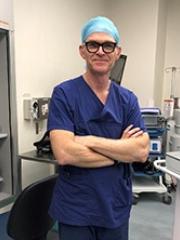Professor Andrew Barbour

Professor Andrew Barbour leads the Surgical oncology group.
Researcher biography
Professor Andrew Barbour is an academic general surgeon who specialises in upper gastrointestinal, pancreatic, melanoma and sarcoma surgery.
On completion of his training, Dr Barbour worked at the Bristol Royal Infirmary as an Upper Gastrointestinal and Hepatobiliary Surgery Fellow and then as a Surgical Oncology Fellow at the Memorial Sloan-Kettering Cancer Centre, New York.
Professor Andrew Barbour specializes in the treatment of oesophageal, gastric, and pancreatic diseases, as well as melanoma and soft tissue tumours. He has expertise in minimally invasive treatments these conditions, including robotic surgery, minimally invasive oesophagectomy, laparoscopic anti-reflux surgery (fundoplication), laparoscopic gastrectomy, and laparoscopic pancreatectomy.
Professor Barbour's research interests are in the treatment of cancer. His academic interests have encompassed the areas of 1) clinical research, including randomised controlled clinical trials, 2) laboratory based research, including molecular biology pertinent to upper gastrointestinal disease, pancreatic cancer and melanoma, 3) translational research integrating the laboratory and clinical domains, and 4) health-related quality of life and patient reported outcomes research.
As a clinical researcher, Prof Barbour has been active in the conduct of clinical trials at Phase I, II and III levels. He was the Principal Investigator for investigator initiated, multicentre phase II trials in oesophageal (DOCTOR trial) and pancreatic cancer (GAP Trial), funded by the NH&MRC and sponsored by the Australasian Gastrointestinal Trials Group (AGITG). Both of these national trials include biological substudies with tumour tissue and blood banking and subsequent molecular analyses aimed at answering specific questions, including the identification of biomarkers of response to therapy. These studies are aimed at developing personalized, precision therapy for cancer. The DOCTOR trial was the first trial to use PET scans to "tailor" or "personalize" therapy for patients with oesophageal cancer. The GAP trial has shown that pre-operative chemotherapy is a safe strategy for patients with pancreatic cancer. Building on the GAP trial, the AGITG has undertaken the MRFF funded MASTERPLAN clinical trial for pancreatic cancer exploring th e role of stereotactic radiation in pancreatic cancer. Professor Barbour is the Chair of the AGITG Upper GI working party and a member of the AGITG Board.
Prof Barbour is a translational researcher at the School of Medicine, The University of Queensland. He is the head of Surgical Oncology Lab at the School of Medicine. His research has focused on using genomic, epigenomic, mRNA expression and next generation sequencing data to classify oesophageal adenocarcinoma (OAC), pancreatic cancer and melanoma and to identify biomarkers of outcome. His lab team was the first to identify genomic catastrophes as potential drivers for oesophageal adenocarcinoma. In addition, his lab is seeking to identify genetic markers in melanoma that will identify patients at high risk for recurrence following surgery and to identify patients who will benefit from the current exciting advances in treatment for advanced melanoma. His work in melanoma is supported by a Queensland Advancing Clinical Research Fellowship. He was also a member of the Australian Pancreatic Cancer Genome Initiative (APGI) that has published several key studies that have improved our understanding of pancreatic cancer. His lab is currently undertaking studies using next generation sequencing of tumour and circulating tumour DNA. Professor Barbour is the Chief Investigator for the Cancer Evolution Biobank based at the Translational Research Institute. This biobank contains tumour tissue and blood from patients with melanoma, oesophageal or gastric cancer linked to clinical outcomes and supports several research projects.
